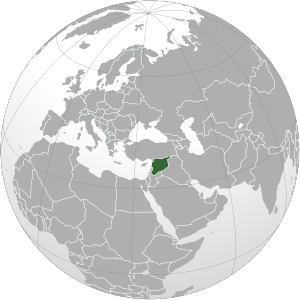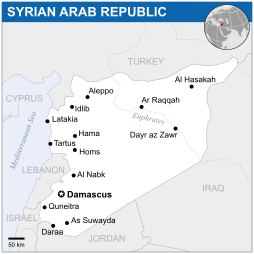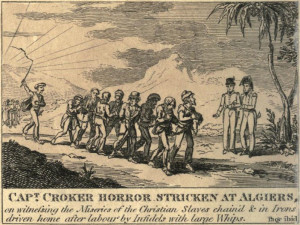A young acquaintance shocked me recently while discussing the horrific onslaught by the Islamic State terrorists in Iraq and Syria. He confessed he had only a vague idea of where the two countries were located and an even hazier notion as to goals of the terrorists’ campaign of mayhem and slaughter.

Syria (orthographic projection), from Wikipedia
Even so he had emerged from our education system with only the sketchiest idea of the nature and shape of the world we live in, or how it got to be that way.
But then, of course, geography has not been taught as a subject in public schools, here or on the other side of the Atlantic, for years—decades, even. The same is true of history, geography’s companion discipline. The two subjects are now loosely lumped together under the heading “Social Studies.”
If “Social Studies” were simply a harmonization and rationalization of two closely related subjects, that would be one thing—unnecessary, perhaps; excessive, probably; but essentially benevolent in its intent. When one examines its fruits, however, one can see the results have been anything but laudable.
Today my young friend and, indeed, a majority of American children have only the haziest picture of the geography of the country in which they live, and an even vaguer idea of its history. As to world geography, forget about it.
This has exceedingly serious implications for the future of democracy: Not least, an electorate which cannot locate New Jersey, New York,and Staten Island on a map can scarcely be expected to pass an informed judgment on the government’s response to Hurricane Sandy.

Syria, from Wikipedia
In short, our abandonment of the serious study of geography in our public schools leaves America prey to demagogues, deceivers, and fanatics of every stripe. And the same goes for the bowdlerization of our history.
More than 30 years have passed since my daughter asked: “Mommy, what did men do during the Revolution?”
Her schoolbooks dealt extensively with how the revolution affected women, Native Americans, and, to a lesser extent, slaves. But the roles of the founding fathers and the fighting men were treated so casually as to virtually ignore them. Things have not improved in the interim.
The problem is that social studies as a subject was conceived neither to teach us history nor inform us about the world in which we live. Its primary purpose seems to be social engineering—to impart “proper attitudes” and foster “appropriate behavior.” In short, it is history and geography bent to the purpose of social engineers.
Why, for example, teach children to locate the continents or the world’s capitals when learning how far flung places are tends to undermine the goal of teaching them to think globally?
Similarly, our self-anointed Solons have expurgated religion from Western history—presumably on grounds that religion is divisive, or gets in the way of our sex lives, or some other such nonsense.
Thus the role of theology—an all–consuming hot intellectual interest of the world from the Dark Ages, through the Middle Ages and the Renaissance to the 20th Century—are entirely ignored in the exploration of events that shaped our planet.
One might not like religion or the religiously minded any more than one likes leprosy, syphilis, or the Black Death. But all three played a major role in shaping the foundations upon which our history is laid. And discussion of them should not be suppressed simply because they are distasteful.
Moreover, if we fail to understand the past, it is unlikely we shall understand the present, and this bodes evil for that which is to come. And, as it happens, a worrisome failure to understand the past is currently threatening our future.
Our political leaders have repeated told us that Islam is a religion of peace and Islamic resentment against the West is largely fuelled by the devastation inflicted on the Moslem world by the Crusades.
What they failed to have explained, however, is that the Crusades were the West’s much belated response to more than 400 years savage jihad that had destroyed countless thriving Christian communities in North Africa and the Middle East, and had subjugated all Portugal, Spain and Sicily and much of France and Italy to brutal Moslem rule.
Nor do they explain that terrorism, kidnapping, and enslavement have been the primary tools of Islamic evangelism from its very inception, and that the United States has been a victim of jihadist aggression from the very moment of its independence.

Captain Walter Croker witnessing the miseries of Christian slaves in Algiers, 1815, from Wikipedia
Unable to raise funds to pay the ransom for the crews, the U.S. representative was compelled to borrow from a friendly Jewish moneylender living in Algiers to pay the nearly $1 million ransom. But this only served to encourage terrorism.
Well into the first third of 19th century, two thirds—repeat two thirds—of the U.S. federal budget went to paying off the maritime terrorists whose direct descendants today hijack, bomb, kidnap, and massacre not just in the Middle East, but on a world-wide scale.
Such knowledge might not encourage people to support current counter-terrorist policies—rather the contrary. But absent such an historical perspective how can they form worthwhile opinions one way or the other. GPH✠


